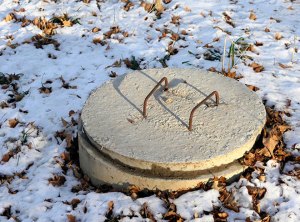If you’re a homeowner with an aerobic septic system, you may be wondering how to protect it during the winter months. Cold weather can pose unique challenges for septic systems, but with the right maintenance, you can ensure that your system stays in good working order. In this article, we’ll provide you with helpful tips and advice on how to winterize your aerobic septic system and keep it functioning efficiently throughout the colder seasons.
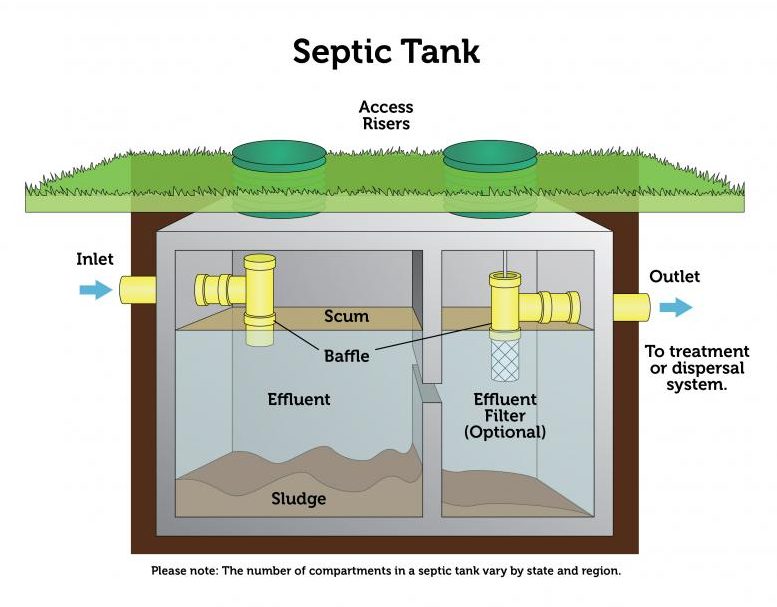
Insulate the System
Insulate the Tank
To protect your aerobic septic system from the cold weather, it is important to insulate the tank properly. Applying insulation around the tank helps to maintain a consistent temperature inside, preventing it from freezing during the winter months. You can use foam insulation or insulating blankets specifically designed for septic tanks. Make sure to cover all sides of the tank, including the lid, to provide maximum protection.
Insulate the Pipes
In addition to insulating the tank, it is crucial to insulate the pipes connected to your aerobic septic system. Exposed pipes are vulnerable to freezing, which can lead to blockages and damage. Insulating pipes with foam sleeves or pipe insulation will help to maintain a consistent temperature and prevent freezing. Pay special attention to areas where pipes are exposed or near exterior walls, as these are more susceptible to cold temperatures.
Insulate the Pump
The pump is a critical component of your aerobic septic system and needs to be insulated to ensure its proper functioning during cold weather conditions. Insulating the pump will help to keep it at an optimal temperature, preventing freezing and potential damage. Use insulation blankets or jackets specifically designed for pumps to provide the necessary protection. Make sure to follow the manufacturer’s recommendations and properly secure the insulation around the pump.
Maintain Proper Water Levels
Monitor Water Usage
To protect your aerobic septic system from cold weather-related issues, it is important to monitor your water usage. Excessive water usage can put a strain on the system, causing it to work harder and potentially leading to freezing or other problems. Be mindful of your household’s water consumption and take steps to conserve water when possible. This includes fixing leaky faucets, using water-efficient appliances, and practicing water-saving habits such as taking shorter showers or only running the dishwasher and washing machine with full loads.
Avoid Excessive Water Discharge
In cold weather, it is essential to be mindful of your wastewater discharge to prevent potential freezing and other complications. Avoid overwhelming your aerobic septic system by avoiding excessive water discharge. This means avoiding activities like doing multiple loads of laundry in a short period or taking extra-long showers. Instead, spread out your water usage throughout the day to give the system enough time to process the wastewater properly without being overloaded.
Prevent Freezing of Effluent
Effluent, the liquid waste that gets discharged from your aerobic septic system, can freeze in cold weather conditions, leading to blockages and system malfunctions. To prevent freezing of effluent, it is important to provide proper insulation in key areas. This includes insulating any effluent pipes that are exposed to the elements, as well as keeping the drain field covered with insulating materials. These measures will help to maintain the necessary temperature and prevent freezing, allowing your septic system to function properly throughout the winter.
Protect the Control Panel
Ensure the Panel is Properly Sealed
The control panel of your aerobic septic system is responsible for monitoring and regulating the system’s functions. It is crucial to protect the control panel from cold weather and moisture to prevent damage and ensure its proper operation. Start by checking that the panel is properly sealed and free from any gaps or cracks that could allow moisture to penetrate. Use caulk or sealant to fill in any gaps and create a watertight seal. This will help to keep the control panel dry and protected from the elements.
Shield the Panel from Moisture
Moisture can be detrimental to the control panel of your aerobic septic system, potentially causing electrical issues and malfunctions. Shielding the panel from moisture is essential to its longevity and functionality. If the control panel is located in an area prone to moisture, such as a basement or crawl space, consider installing a waterproof enclosure to protect it. Additionally, ensure that the area around the control panel is free from water leaks or excessive moisture buildup.
Provide Additional Insulation if Necessary
Depending on the location of your aerobic septic system and the severity of the winter weather in your area, you may need to provide additional insulation to the control panel. Extra insulation can help to maintain a consistent temperature around the panel, preventing it from freezing or experiencing temperature fluctuations. Use insulation materials such as foam board or insulation blankets to create a protective barrier around the control panel. Be sure to follow the manufacturer’s recommendations and guidelines when applying insulation.
Prevent Freezing of Drain Field
Divert Water Away from Drain Field
The drain field is a critical component of your aerobic septic system, responsible for the final treatment and disposal of wastewater. During cold weather, it is important to prevent freezing of the drain field to avoid system malfunctions. One way to achieve this is by diverting water away from the drain field. Ensure that your gutters and downspouts are directing water away from the area, and fix any drainage issues that could result in excess water pooling near the drain field. This will help to keep the drain field dry and prevent freezing.
Avoid Compacting the Soil
Compacted soil can impede the proper functioning of the drain field and increase the risk of freezing. Avoid driving heavy vehicles or machinery over the drain field area, as this can compact the soil and restrict the flow of wastewater. Additionally, avoid parking vehicles or placing heavy objects on the drain field, as they can also contribute to soil compaction. By preserving the integrity of the soil, you will help to maintain the drainage capabilities of the drain field and prevent freezing.
Use Insulating Materials to Cover the Drain Field
Providing insulation to the drain field can offer an additional layer of protection against freezing during cold weather. Insulating materials, such as straw, hay, or even insulating blankets, can be used to cover the drain field. These materials help to insulate the soil, keeping it at a more stable temperature and preventing freezing. Cover the drain field with a layer of insulating material, ensuring that it is evenly distributed and does not obstruct the flow of wastewater.
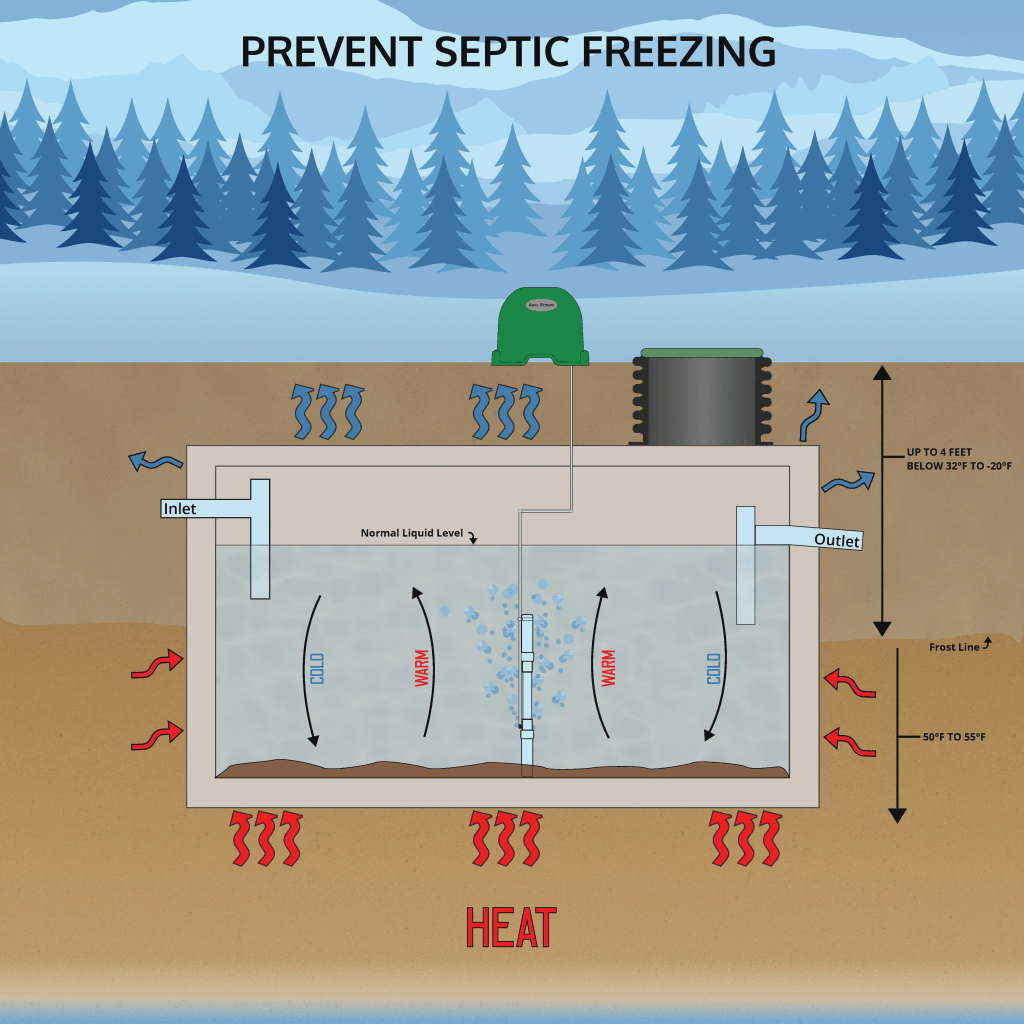
Monitor the Air Compressor
Inspect for Leaks
The air compressor is a vital component of your aerobic septic system, as it supplies oxygen to the wastewater treatment process. To ensure its proper functioning during cold weather, regularly inspect the air compressor for any leaks. Check the connections, hoses, and valves for signs of air leakage. If you notice any leaks, repair or replace the affected parts promptly. A properly sealed air compressor will help to maintain the necessary oxygen levels in your aerobic septic system and prevent freezing.
Clean or Replace Filters
The filters in your aerobic septic system’s air compressor play an important role in ensuring the quality of the air being supplied to the system. Over time, these filters can become clogged with debris, reducing their effectiveness. To prevent freezing and other issues, regularly clean or replace the filters according to the manufacturer’s recommendations. By keeping the filters clean and in good condition, you will help to maintain the optimal airflow in your aerobic septic system.
Adjust the Pressure as Needed
Proper pressure is essential for the air compressor to function efficiently and prevent freezing of the system. During cold weather, it may be necessary to adjust the pressure settings to accommodate for changes in temperature. Consult the manufacturer’s instructions or seek professional advice on how to adjust the pressure settings of your specific aerobic septic system. By ensuring that the pressure is set correctly, you can help to prevent freezing and maintain the proper operation of your system.
Check the Alarm System
Test the Alarm Functionality
The alarm system in your aerobic septic system is designed to alert you of any potential issues or malfunctions. To ensure its reliability during cold weather, regularly test the alarm functionality. Follow the manufacturer’s instructions on how to properly test the alarm system and ensure that all components are functioning as intended. If you encounter any issues or the alarm does not activate during testing, contact a professional to address the problem and ensure that your system is properly protected.
Replace Batteries if Necessary
Batteries play a crucial role in powering the alarm system of your aerobic septic system. Cold weather can affect battery performance, potentially causing them to drain more quickly. To prevent any interruptions in the alarm system’s functionality, regularly check and replace the batteries as needed. A fresh set of batteries will ensure that the alarm system is powered properly and can provide the necessary alerts in case of any system abnormalities.
Ensure the Alarm is Visible and Audible
In addition to testing the functionality of the alarm system, it is important to make sure that the alarm is visible and audible. During cold weather, snow and ice accumulation can obstruct the alarm, making it difficult to see or hear in case of an emergency. Clear away any snow or ice buildup around the alarm, ensuring that it is visible and easily identifiable. Consider placing reflectors or markers near the alarm to increase visibility, especially during nighttime or severe weather conditions.
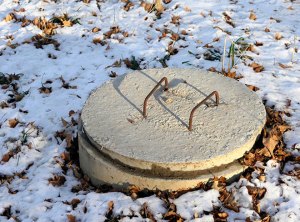
Protect the System from Snow and Ice
Remove Snow Accumulation
Snow accumulation on and around your aerobic septic system can cause numerous issues, including freezing, blockages, and potential damage. Make it a priority to regularly remove snow buildup from the system components, such as the tank, pipes, and control panel. Use a snow shovel or a snowblower to carefully clear the snow, taking care not to damage any parts of the system. By keeping the system free from snow, you will help to maintain its proper operation and prevent potential problems.
Avoid Using Snow Melt Products
While it may be tempting to use snow melt products to quickly clear snow and ice around your aerobic septic system, it is best to avoid them. Many snow melt products contain chemicals that can be harmful to the environment and may negatively impact the bacterial balance within your septic system. Instead of relying on snow melt products, focus on physically removing snow and ice using non-toxic methods. This will ensure the safety and health of your septic system while protecting the surrounding environment.
Prevent Ice Formation on System Components
In addition to removing snow accumulation, it is important to prevent ice formation on the components of your aerobic septic system. Ice can impede the proper functioning of the system and potentially cause damage. To prevent ice formation, consider using insulation materials such as insulation blankets or foam board to cover exposed parts of the system, including the tank, pipes, and control panel. These materials will help to maintain a consistent temperature and prevent ice from forming, keeping your septic system fully operational during the winter months.
Maintain Regular Service
Schedule Professional Inspections
Regular inspections by a qualified professional are crucial for the proper functioning and longevity of your aerobic septic system, particularly during the winter months. Schedule routine inspections to have your system thoroughly assessed and serviced. A professional will be able to detect any potential issues or areas of concern and provide the necessary maintenance and repairs. By staying on top of regular service, you can prevent larger problems from arising and ensure the optimal performance of your septic system throughout the cold weather season.
Perform Routine Maintenance Tasks
In addition to professional inspections, there are several routine maintenance tasks you can perform to keep your aerobic septic system in good condition during cold weather. This includes checking for leaks, inspecting connections, and cleaning or replacing filters as needed. Follow the manufacturer’s recommendations for routine maintenance and make sure to address any maintenance tasks promptly. Regular maintenance will help to prevent costly repairs and extend the lifespan of your septic system.
Keep Records of Maintenance Activities
Keeping records of all maintenance activities related to your aerobic septic system is essential for proper management and troubleshooting. Create a system to track and document all service visits, inspections, repairs, and any other maintenance tasks performed on your septic system. This record-keeping will provide valuable information for future reference and help you stay organized with your septic system maintenance. In case of any issues or questions, you will have a comprehensive history to consult, allowing for more effective troubleshooting and decision-making.
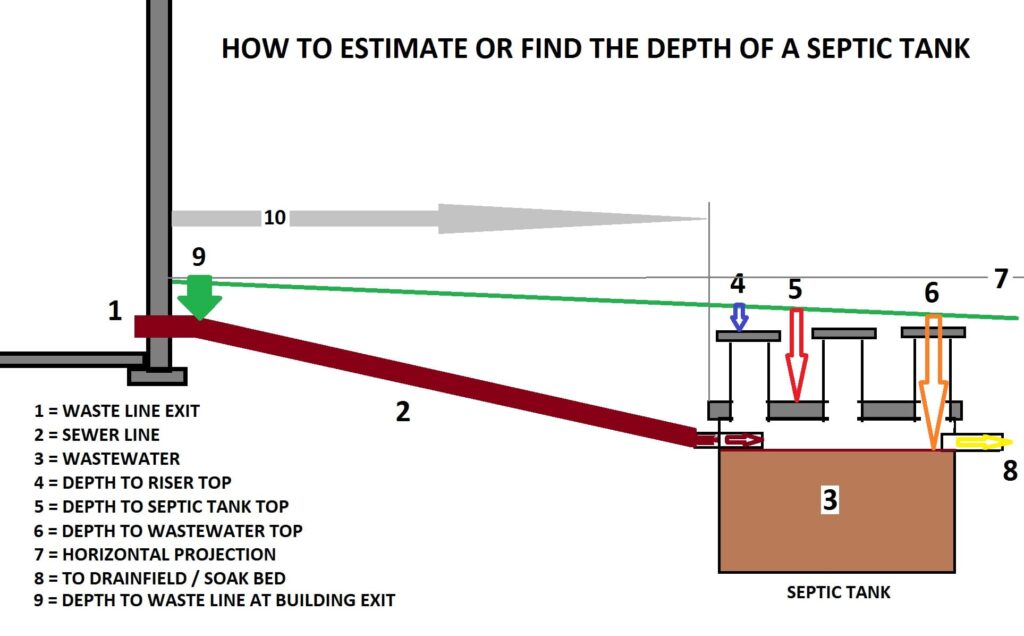
Prevent Build-up of Solid Waste
Avoid Flushing Non-Biodegradable Items
To maintain the proper functioning of your aerobic septic system during cold weather, it is important to avoid flushing non-biodegradable items down the toilet. These items can accumulate and cause blockages, leading to potential system malfunctions. Ensure that everyone in your household understands what should and should not be flushed. Non-biodegradable items, such as paper towels, hygiene products, and chemical cleaners, should be disposed of in the trash instead. This will help to prevent unnecessary strain on your septic system and avoid potential issues during cold weather.
Dispose of Kitchen Waste Properly
In addition to avoiding flushing non-biodegradable items, it is equally important to dispose of kitchen waste properly. Fats, oils, and grease should never be poured down the drain, as they can solidify and cause blockages in your septic system. Instead, collect these substances in a sealable container and dispose of them in the trash. By practicing proper kitchen waste disposal, you can prevent the build-up of solid waste in your septic system and ensure its efficient operation, even in cold weather.
Use Septic-Safe Toilet Paper
Choosing the right toilet paper is crucial to prevent clogs and system malfunctions in your aerobic septic system. It is recommended to use septic-safe toilet paper that is specifically designed to break down easily in septic systems. This type of toilet paper is more biodegradable and less likely to cause blockages or build-up. Check the packaging for labels indicating it is safe for septic systems. Using septic-safe toilet paper will contribute to the overall health and longevity of your septic system, especially during cold weather.
Educate Household Members
Teach Proper Septic System Usage
Education is key when it comes to maintaining a healthy and functional aerobic septic system throughout the cold weather months. Take the time to educate all household members, including children, on proper septic system usage. This includes explaining what can and cannot be flushed down the toilet, how to conserve water, and the importance of regular maintenance. Encourage everyone to be mindful of their actions and to follow the guidelines provided to ensure the longevity and efficiency of the septic system, regardless of the weather conditions.
Explain the Impact of Cold Weather
Helping household members understand the impact of cold weather on the aerobic septic system is crucial for its proper maintenance. Explain that freezing temperatures can lead to blockages, system malfunctions, and potentially costly repairs. Emphasize the importance of insulation, water conservation, and regular maintenance during the winter months. By explaining the impact of cold weather and the measures to take, you will promote a sense of responsibility and encourage everyone to contribute to the health and longevity of the septic system.
Encourage Responsible Water Usage
Responsible water usage is essential for maintaining a healthy and functional aerobic septic system, especially during cold weather. Encourage household members to be mindful of their water consumption and to practice habits that conserve water. This includes taking shorter showers, turning off faucets when not in use, and only running the dishwasher and washing machine with full loads. By fostering responsible water usage, you will help to prevent overloading the septic system, reduce the risk of freezing, and promote the overall efficiency of your aerobic septic system throughout the winter.

